| | | | It's Native American Heritage Month:
Time to Remember, Celebrate and Dream! | | | | There are some places that allow a person to dream more than others. Our nation’s capital is one such place because of the potential any one of us has to effect change through our government representatives. As I wrote in the last issue of The Juniper, I traveled to Washington, D.C. last month as a guest of environmental and social justice nonprofit partner, GreenLatinos. GreenLatinos invited Friends of the Inyo and several other nonprofits from around the nation to join them for a week of advocacy around the Latino Climate Justice Framework, or LCJF, a blueprint to use in climate solution advocacy efforts on behalf of Latino and other underrepresented communities of color across the country. I am proud to have helped out as a collaborator in the crafting of the LCJF section that deals with “Providing equitable access and representation.” Additionally, in strategic meetings with staff members of federal elected officials on Capitol Hill, trip attendees also had the opportunity to highlight any advocacy priority areas our organizations are working on. I was prepared to highlight two things: - An initiative FOI has been collaborating on for several months with GreenLatinos and our funding partner, Conservation Lands Foundation (CLF): “The Need for Greater Multilingual & Cultural Sensitivity in National Environmental Policy Act (NEPA) Implementation.” (We have actually mentioned this effort in this year's January and June issues of The Juniper.) The idea is to have the various government agencies provide NEPA documentation and engagement opportunities throughout the U.S. in a more linguistically diverse, culturally sensitive way—similar to a much scaled-down version of how the U.S. Census Bureau rolls out the census multilingually—to thereby encourage greater participation from minority communities that are often the most impacted by NEPA decisions concerning federal projects like roads, bridges, and pipelines. With the advent of quality automated translation software and other technology resources, this initiative is doable and could give FOI an opportunity, together with our partners, to effect change at the national level through advocacy.
- A request for support of Bureau of Land Management (BLM) National Conservation Lands funding. Specifically, for Fiscal Year 2023, we highlighted the need for BLM to fund resource management planning (RMP), as the plans we have in California are some of the oldest in the country. For example, our Bishop BLM RMP is from 1993. New science and impacts on the ground need to be incorporated into how the BLM manages its land.
The Dreaming Begins When you are doing lobbying in Washington, it often feels like "business speed dating," where you have just a few minutes to pitch an idea to a potential funder or future partner who might help bring it to fruition through the resources they can tap into. The thing is, half a dozen other people are also doing the same thing and a staff member of your elected representative is feverishly taking notes to keep all the asks straight for when they eventually get to debrief their boss. You are basically planting seeds hoping that at least some of them, or even just one of them, will germinate. Well, we definitely planted seeds that week, at the offices of our two California U.S. Senators, a handful of U.S. Representatives, and with staff members of the U.S. Department of the Interior and the Council on Environmental Quality. Our flurry of advocacy included ample business card exchanges, distribution of paper and electronic copies of materials to go with the topics presented, and the sending off of follow-up e-mails. We have begun important conversations with federal representatives about issues affecting the environment and people we serve. Now we wait, continue to follow up, and dream. Stay tuned for updates on these efforts. The Dreaming Continues At the end of my trip to D.C., I had a little time for sightseeing and decided to check out the National Museum of the American Indian. I was selective about the exhibits I visited and avoided the one about treaties between the United States and American Indian Nations because I did not want my hopeful week in Washington to end on a down note as I read interpretive panels about legal instruments designed to reduce the original inhabitants of the U.S. to mostly landless second-class citizens. Instead, I chose to view some of the museum’s extensive cultural and art exhibits, where I could, even for a moment, be transported to a world of possibilities where: - Little boys would extract latex from rubber trees to make their own balls for sport, and little girls would carry their dolls on mini cradleboards on their backs, as play became a transformative teaching tool for children progressing toward youth and eventually adulthood;
- A communal dance could be a source of healing;
- A raven could steal the sun; and
- The spiritual, natural, and human realms were a tripartite whole, rather than disjointed, broken pieces of a troubled world.
As we enter into Native American Heritage Month, I want to keep these memories and the wisdom I learned on my trip close to my heart, and encourage everyone to visit their local Native American cultural center, go to their local library or bookstore and pick up a book on Native American culture, do some online research, respectfully visit a Native American heritage site or participate in a local Native American-themed event, and strive to learn, in humility, about the rich legacy the Ancients left not just for their direct descendants, but for all of us. Their sustainable world made sense in ways our modern world of unsustainability and climate crisis does not. We need their wisdom now more than ever. We need their dreams. Happy Native American Heritage Month! | | | 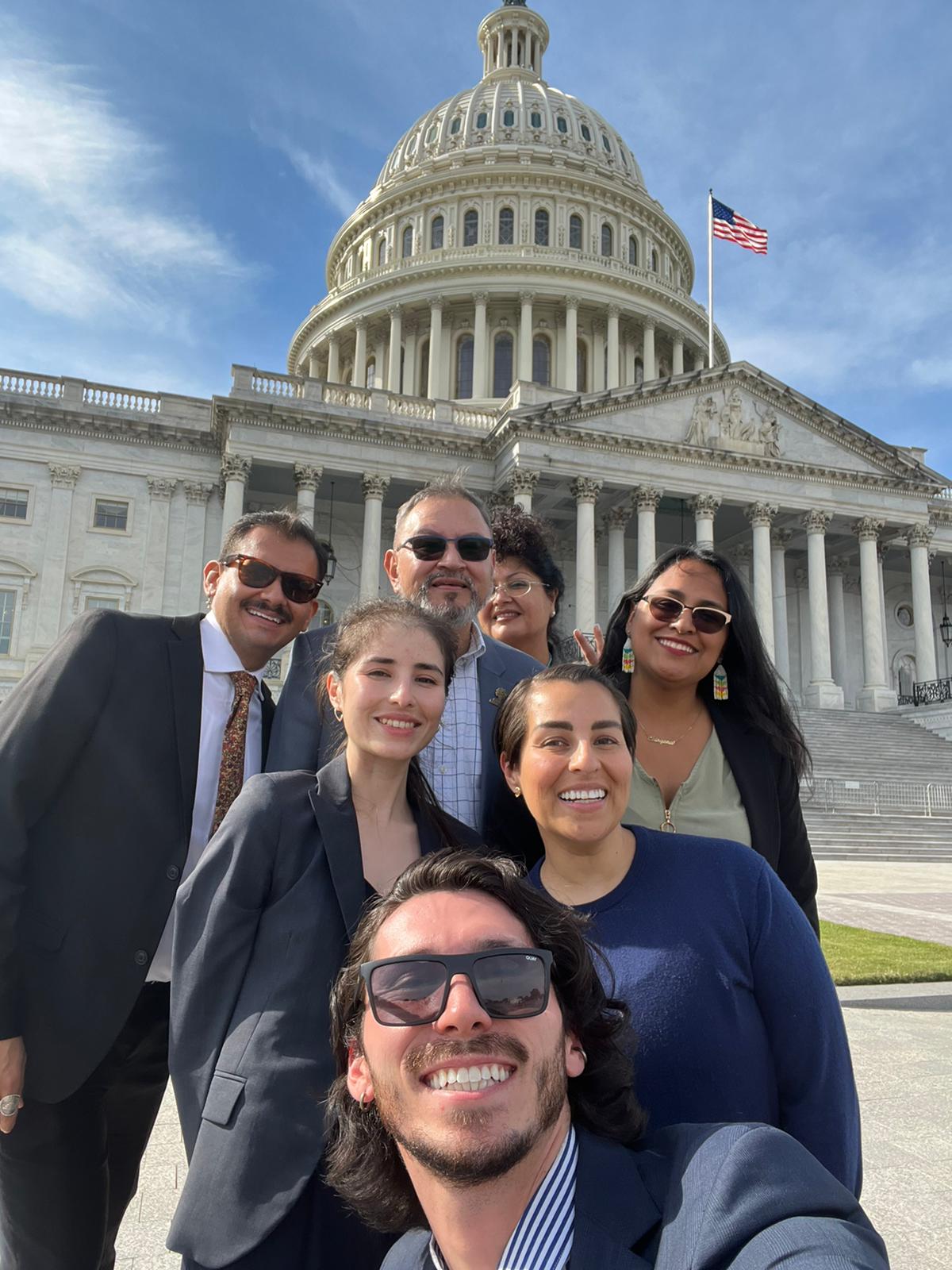 | This group selfie in front of the U.S. Capitol was taken by Nathan Park (front), Associate Legislative Representative of EarthJustice, an organization that was instrumental in helping GreenLatinos schedule a series of lobbying visits on Capitol Hill the week of Oct. 10. I am in the back, in the center, flanked by two GreenLatinos staff members: Edder Diaz Martinez, Communications Manager (left), and Mariana Del Valle Prieto Cervantes, Director of Strategic Initiatives (right). The others represent California-based conservation organizations: Second row (L-R), Catalina Gonzalez, Center for Progressive Reform, and Claudia Pineda-Tibbs, Sustainability Program Manager at Monterey Bay Aquarium; and rear, Noemi Lujan-Perez, President & CEO of ECODiversity. Lobbying groups were divided strategically by the geographic region they serve, to make it easier for everyone to meet with the staff of their Congressional representatives. | | | |  | Council on Environmental Quality Chair Brenda Mallory, a very gracious person, indulged me by allowing me to take a selfie together with her during a GreenLatinos Live dinner and awards program at a local eatery in Washington, D.C. on October 13. Chair Mallory was confirmed by the United States Senate on April 14, 2021, and sworn in as the 12th Chair of CEQ. She is the first African American to serve in this position. As Chair, she advises the President on environmental and natural resources policies that improve, preserve, and protect public health and the environment for America’s communities. | | | | 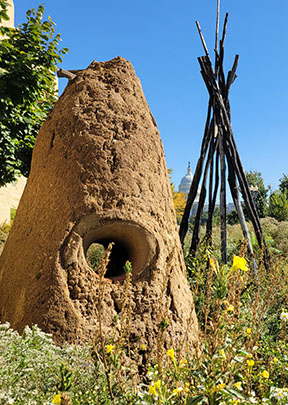 | The U.S. Capitol Building looks small in the distance behind these sculptures outside of the National Museum of the American Indian. Nora Naranjo-Morse, a member of the Santa Clara Pueblo in New Mexico, created these mud, clay, stone and wood pieces on site in 2007. Called "Always Becoming," they are meant to change over time and represent growth, transformation, Native people's relationship with the land, and "a past from which we continue to learn." | | | | | | In this issue of The Juniper: - We share a joyful update on our recent appeal for funding support for our campaign to #ProtectConglomerateMesa.
- Wildfires is the buzzword around public events hosted by the White Mountain Research Center in Bishop tonight (11/1); and virtually tomorrow (11/2), and in person in Mammoth on Thursday (11/3), by The Whitebark Institute in partnership with the U.S. Forest Service.
- If giving back is your gig, find out about the American Alpine Club's Bishop Craggin' Classic Stewardship Event coming up Nov. 13. As usual, volunteering is in partnership with Friends of the Inyo!
- Friends of the Inyo is still advertising a NEW JOB OPPORTUNITY to help further our public land protection work in partnership with Southern Inyo Tribes.
- Get the latest scoop on water justice from the Keep Long Valley Green Coalition.
- Learn about our Legacy Giving Program. It's easy and doesn't cost a penny during your lifetime.
- And more!
Remember: When scrolling through our newsletter, you might come across a message at the bottom that says [Message clipped] and/or the hyperlink "View Entire Message." Be sure to click on the link to keep reading, as more news will be displayed. This is done to prevent bandwidth issues in e-mail delivery. Thank you. | | | | Happy reading—and if you like what you read, happy sharing! Sincerely, Louis (Lou) Medina
Communications and Philanthropy Director
Louis@friendsoftheinyo.org | | | | | | Last month, we asked for your support in raising $25,000 to help us in our campaign to ensure permanent protection for Conglomerate Mesa, and you came through! A whopping 95% of our goal has been met, and your generous giving provides a supercharged "jump-start" to the campaign with a view toward 2023! Stay tuned for updates on our ongoing efforts to #ProtectConglomerateMesa. | | 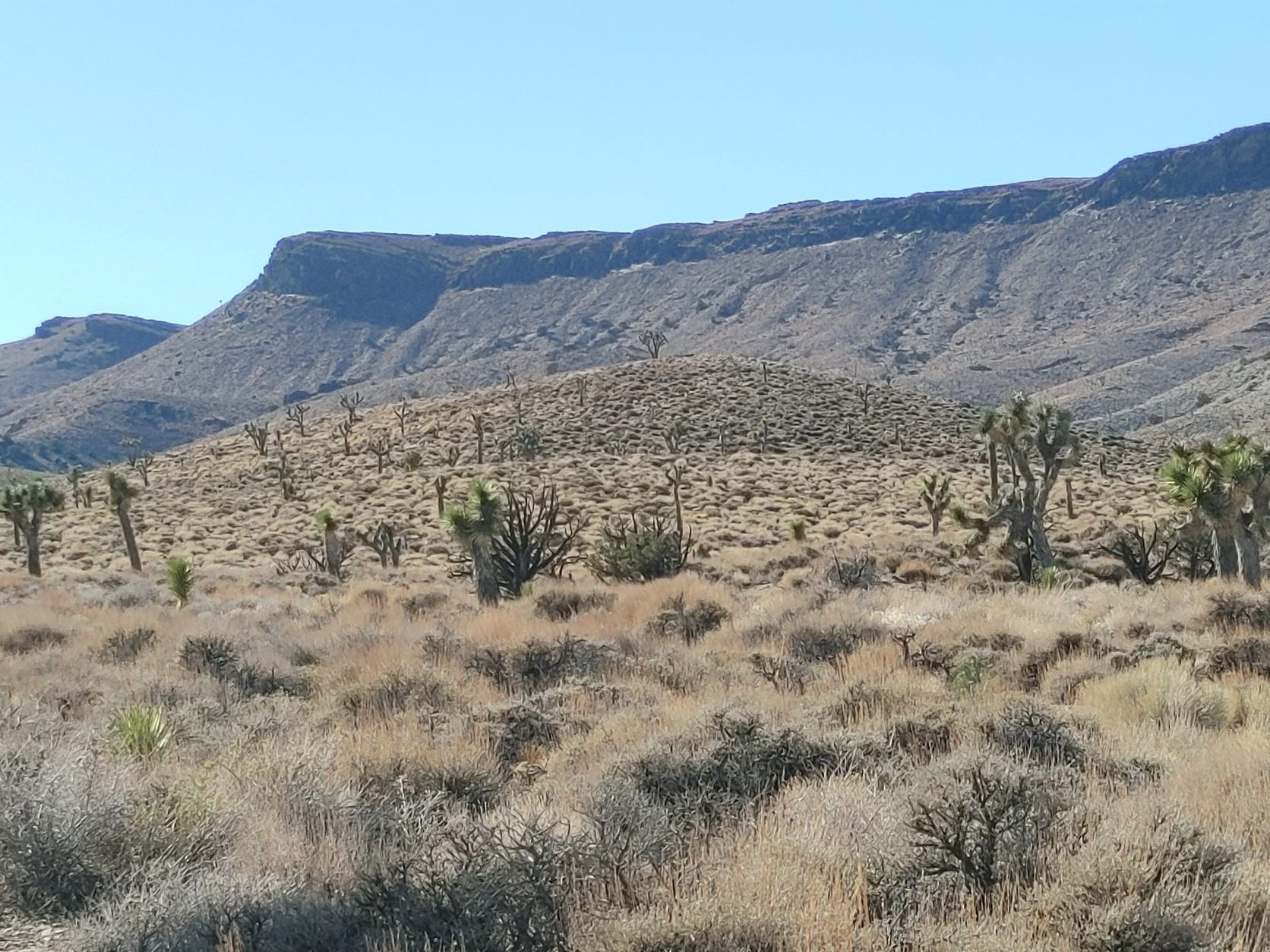 | | | Take advantage of a FREE educational event on an ever-relevant topic in the Eastern Sierra and throughout our state: wildfires! See flier below for details, including questions. Please do not contact Friends of the Inyo about this event, as we are not an event organizer and are simply helping to promote it in the spirit of protection of our natural lands. Thank you. | | 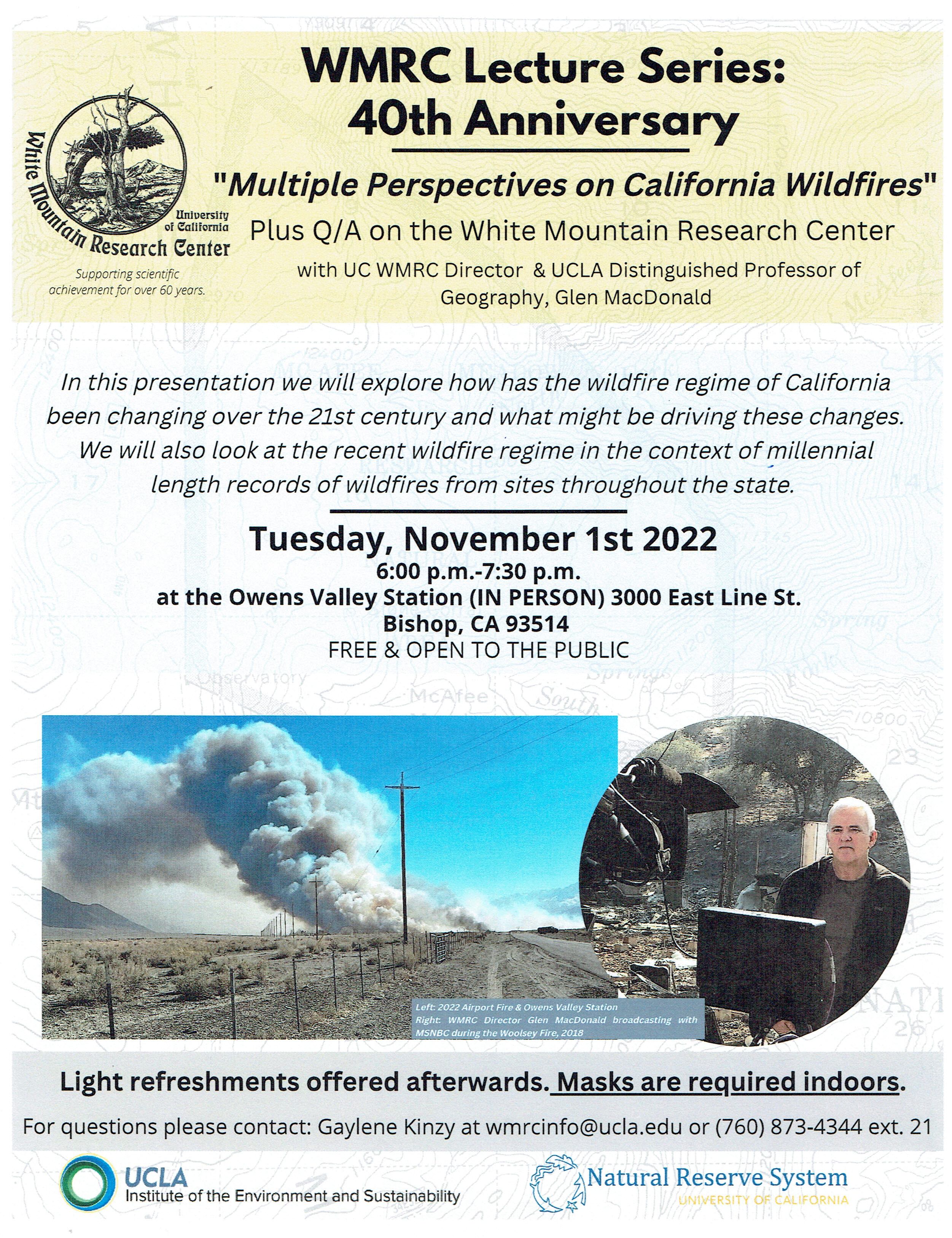 | | | Eastern Sierra Climate and Communities Resilience Project Friends of the Inyo is helping the Whitebark Institute of Interdisciplinary and Environmental Sciences get the word out in English and Spanish about the Public Scoping Meeting taking place this week virtually Wednesday morning, Nov. 2, and in person, in Mammoth, Thursday evening Nov. 3, regarding the Eastern Sierra Climate and Communities Resilience Project, which the institute is hosting together with the U.S. Forest Service. Also known as the "Mammoth Donut Project," the ESCCRP's aim is to create a fire resilient ring around the town of Mammoth Lakes. Input for the project's implementation is sought from Mammoth area residents as well as visitors by Nov. 18. Find out details and download a flier with useful links in English or Spanish at whitebarkinstitute.org. | | | | And for the additional benefit of our Spanish-speaking neighbors, the "Mammoth Donut Project" is the focus of our front-page column in the current (Oct. 27 - Nov. 2) issue of Spanish-language weekly El Sol de la Sierra. Click on the button or image below to read our blog post, which contains links to the online and downloadable pdf versions of the paper, where there is also information, on page 4, about a November 3 immigration clinic in Bishop hosted by Catholic Charities at Our Lady of Perpetual Help Catholic Church. Please help Friends of the Inyo share these news items of relevance to our Spanish-speaking friends and neighbors here in the Eastern Sierra. Gracias! | | | | | | | | | | 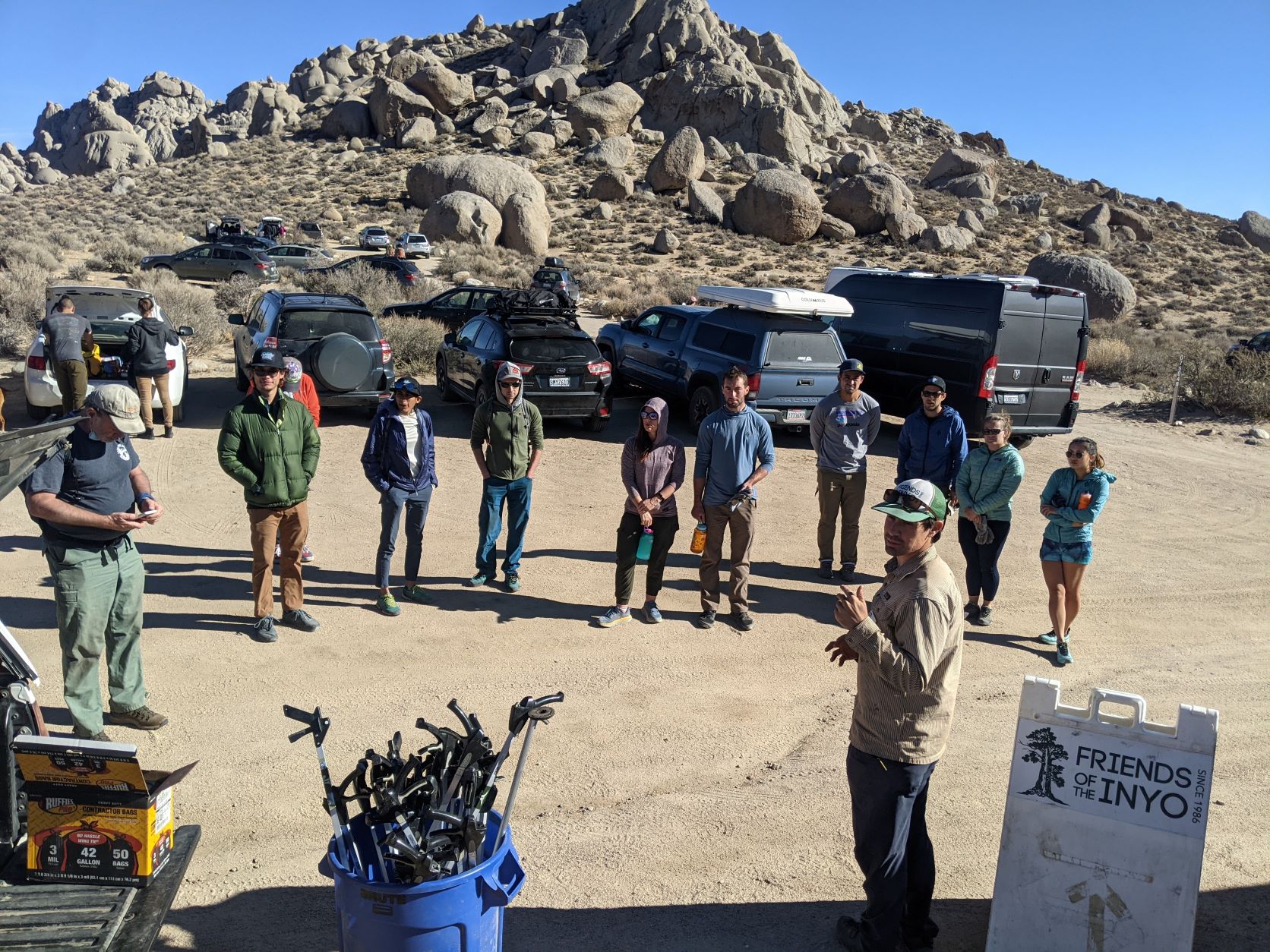 | Mark Your Calendars for American Alpine Club's Bishop Craggin' Classic Stewardship Event Coming Up November 13! Join Friends of the Inyo and our partners, American Alpine Club, Inyo National Forest, Bureau of Land Management, Eastern Sierra Interpretive Association, and Bishop Area Climbers Coalition on Sunday, November 13, the final day of the Bishop Craggin' Classic, for a chance to give back to the Buttermilk Boulders and Volcanic Tablelands, public lands that give so much to the climbing community. Where to meet? What to bring? What materials will be provided? Other questions? Use the button below to access more information through the event post on our website. | | | | | | | | | | | | JOB ANNOUNCEMENT! Friends of the Inyo is looking to hire a Southern Inyo County Tribal Organizer to work in the communities of Southern Inyo County to gather feedback from the indigenous community and develop support for the permanent protection of the Conglomerate Mesa area, a place of cultural significance to the Shoshone and Paiute People. Learn more and find out how to apply using the button below. | | | | | | | | | | 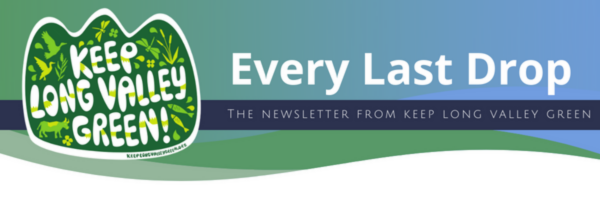 | The latest (October) issue of the official E-Newsletter of the Keep Long Valley Green Coalition (KLVG), Every Last Drop, came out just last Friday. It features two stories: - One by Compiler/Writer Allison Weber, KLVG Coalition Organizer, and
- Another by Sierra Club Range of Light Group Chair Lynn Boulton.
Combined, the stories in this issue provide a good understanding of the types of mitigation projects the Los Angeles Department of Water & Power must effect to "reduce the severity of," or otherwise make up for, the destructive results of its water extraction in the Owens Valley/Eastern Sierra, and how to know whether these projects are succeeding or not, by evaluating the plant cover in affected areas. (Lynn Boulton's article is the first in a series. We will make you aware of subsequent installments as they are published.) | | | | | | | | | | | |  | Want to support Friends of the Inyo? Consider making a donation online today! Thank you for your generous support. | | | | | | | | 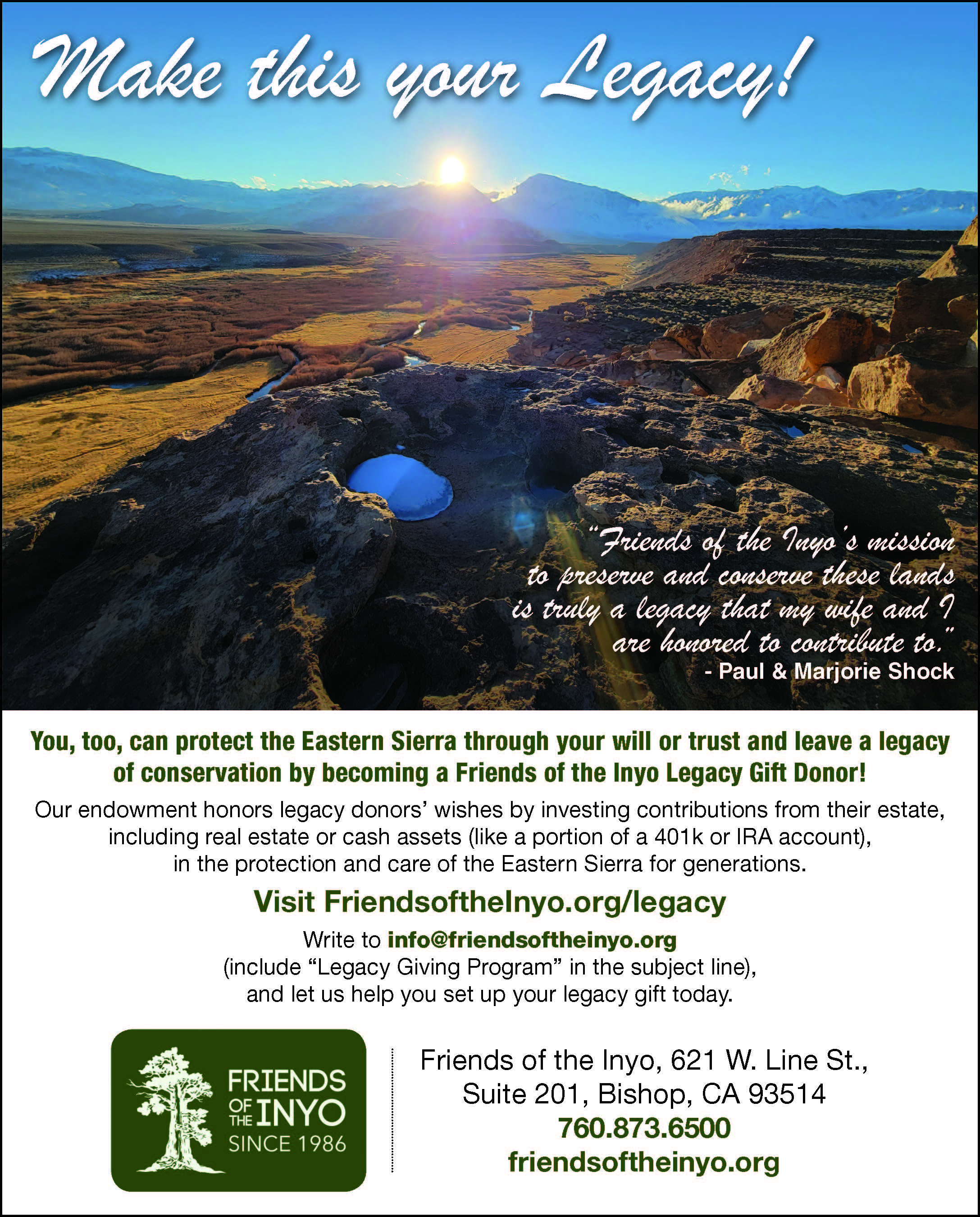 | Friends of the Inyo appreciates the following organizations and local businesses for their generous monetary sponsorship of our programs: | | | | | | | |  | Inyo Mono Alpine County
Cattlemen’s Association | | | | | | | | Remember to update the address to our new location: Friends of the Inyo
621 W. Line St., Suite 201
Bishop, CA 93514 FriendsoftheInyo.org | | | | Like and follow us on social media: | | | | | | |